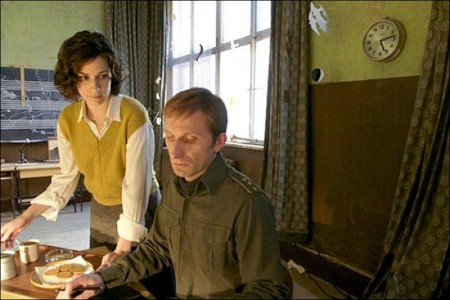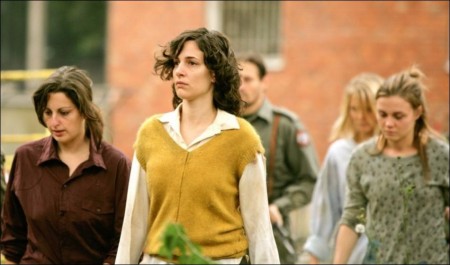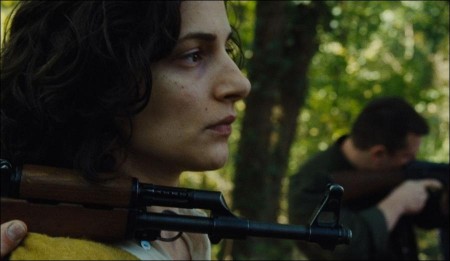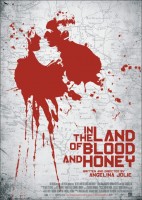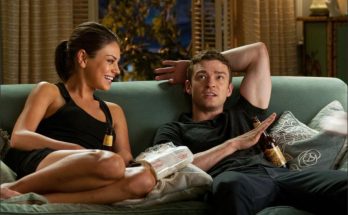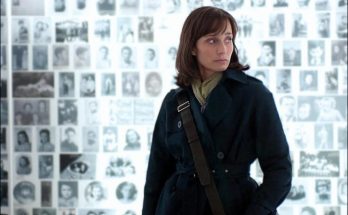Danijel (Goran Kostiæ) and Ajla (pronounced Ayla) (Zana Marjanoviæ) are two Bosnians from different sides of a brutal ethnic conflict. Danijel, a Bosnian Serb police officer, and Ajla, a Bosnian Muslim artist, are together before the war, but their relationship is changed as violence engulfs the country.
Months later, Danijel is serving under his father, General Nebojsa Vukojevich (Rade Šerbedžija), as an officer in the Bosnian Serb Army. He and Ajla come face to face again when she is taken from the apartment she shares with her sister, Lejla (Vanesa Glodjo), and Lejla’s infant child by troops under Danijel’s command. As the conflict takes hold of their lives, their relationship changes, their motives and connection to one another become ambiguous and their allegiances grow uncertain.
In the Land of Blood and Honey is a film marking the directorial debut of actress Angelina Jolie. It is a love story set during the Bosnian War. The film was shot in October 2010 using local actors. It was also shot in two versions – one in English, the other in the Bosnian – Croatian – Serbian language known as BCS. The film is due for release in the United States on December 23, 2011.
The War in Bosnia
For almost five decades after World War II, the Republic of Bosnia-Herzegovina formed part of Yugoslavia, alongside the Republics of Serbia, Croatia, Montenegro, Slovenia, Macedonia, and the semi-autonomous Serbian provinces of Kosovo and Vojvodina. During this time, a rich web of ethnic and religious identities made Bosnia’s population of 4 million one of the most diverse in Europe. Bosnian Muslims formed the largest part of the population, followed by Serbs, Croats, and other groups. All spoke the same language, and intermarriage was common.
Following the death in 1980 of Marshall Josip Broz Tito, Yugoslavia’s long-serving communist leader, previously suppressed tensions between and within the republics began to surface. As economic troubles mounted in Yugoslavia, nationalist leaders gained power, including Franjo Tuðman in Croatia and Slobodan Miloševiæ in Serbia. Miloševiæ proceeded to consolidate Serbian control over the Yugoslav government and army, further alienating the other republics. Following the collapse of Communist regimes elsewhere in Eastern Europe, Croatia, Slovenia, Macedonia, and Bosnia-Herzegovina declared their independence from Yugoslavia.
The Bosnian War erupted in 1992 when Bosnian Serbs, backed by the Yugoslav Army, occupied towns and cities in eastern Bosnia-Herzegovina and laid siege to Sarajevo, the capital, in an attempt to carve out a separate and ethnically pure “Republic of Serbs.” Bosnian Croats, backed by Croatia, also sought to establish their own republic in western Bosnia-Herzegovina, although they would sometimes join with the mostly Muslim Bosnian forces against the Serbs. Early in the Bosnian conflict, a United Nations Protection Force (UNPROFOR) arrived to stop the wider war, but they failed to halt the descent into violence.
The war would become the most devastating conflict in Europe since World War II. Between 1992 and 1995, fighting claimed the lives of approximately 100,000 people and drove more than 2 million people from their homes, as refugees or internally displaced persons. In a pattern of “ethnic cleansing,” militias attacked and expelled civilians in areas under their control to create ethnically pure enclaves. Men and women were often separated and families were split. Many Bosnians of all ethnicities left the country; others were taken into captivity and abused. In one town, Srebrenica, Bosnian Serb forces massacred more than 7,000 Bosnian Muslim men and boys. Throughout the war, as many as 20,000 to 50,000 women were raped, many while in captivity.
In response, the International Criminal Tribunal for the Former Yugoslavia would eventually indict 161 persons of all ethnicities for war crimes, crimes against humanity, and genocide during the Bosnian War and would become the first tribunal to prosecute rape as an independent crime against humanity. The last remaining fugitive from the ICTY was captured in July 2011, and 35 cases remain pending as of November 2011.
Decisive military intervention by NATO and intense diplomatic pressure eventually led to a cease fire and the signing of the Dayton Peace Accords in 1995. Since then, an uneasy peace has prevailed in Bosnia-Herzegovina, but divisions created by the conflict remain, and the struggle for reconciliation continues.
Finding the Right Voices
Jolie knew that this project was one that had to be treated with the proper respect and delicacy. “I went to people in the various governments, people in the international community, the UN and journalists who covered the war, and I asked, ‘Is this right?’ But the most important voices were the people from the area, the actors. They lived through the war. Although the people who covered the story—international journalists, international politicians—had important views, the people who were on the ground, whose families were affected, who were shot at, who were made refugees—they were the ones that I was the most nervous to send the script to and whose opinion I most valued.”
Once the script and the financing had been secured, Jolie set about assembling the right actors for the jobs. It had always been paramount to approach the casting process with sensitivity and care. “When the roles were being cast, we had the casting director ask the actors what they’d gone through, what their backgrounds were,” she says. “I wanted to cast a Bosnian Serb as the lead actor, and a Bosnian Muslim or someone from a mixed family as the lead actress. I also wanted men from Serbia willing to work on the project, not just Bosnian Serbs. That country’s involvement artistically was very important to me.” People from all backgrounds and creeds were asked to come together to tell this story.
The first actor to come on board was Rade Šerbedžija. Šerbedžija plays Nebojsa, the Serb general whose invocations of tradition and nationalism have a strong sway over his conflicted son, Danijel. Croatian Serb by birth and raised in Zagreb, Šerbedžija was known in Hollywood in the 1990s for playing foreign villains. While the character of Nebojsa certainly fell along the villainous spectrum, Šerbedžija sensed something richer and more resonant about him than most depictions of Serb soldiers during the war. “I had been offered a number of roles in films about the war in Yugoslavia, and had refused quite a few,” he says. But Jolie’s script offered a different take on the war.
“Angelina called me and we talked,” says Šerbedžija. “I liked her approach to the subject, and how she talked about it, her motives and her passion.” For Šerbedžija, the scope was what set the film apart. “I think that the script Angelina wrote has the depth of a Greek tragedy, which is really hard to find in today’s movie making,” he elaborates. “That’s why I hope that by approaching the tragedy from an intimate angle, maybe it will help people understand the war as not one happening to some ‘strange people in a far country,’ but to people like them, complex people that get dragged in. It can also happen to them.”
For the rest of the cast, Jolie kept herself anonymous in order to avoid any coloring of the project for the auditioning actors. “The cast didn’t know who was behind the film, or the size of it; I kept my name off the scripts. I just wanted to know if they were responding to the material.” Zana Marjanoviæ, a Bosnian Muslim who plays Ajla, the film’s protagonist, was convinced that the script was a local creation. “Those scenes were so authentic. I was almost sure they had to have been written by a Bosnian writer! It seemed so familiar to me.”
Such a response to the film’s story was crucial for Jolie. “I had already decided that we wouldn’t make the film unless the actors responded positively.” Actor Nikola Djuriæko, a Serbian who plays Serb soldier Darko, remembers when he discovered that Jolie had written the script and was to direct it. “The casting director said to me, ‘She liked you a lot,’” Djuriæko says. “I asked, ‘Who liked me a lot?’ She said, ‘Angelina Jolie.’ I said, ‘Don’t you lie to me!’ It was like winning the lottery, because as an actor in Belgrade, you don’t expect to get an offer like that very often.”
Goran Kostiæ, a Bosnian Serb who plays Danijel, the tortured soldier who’s caught between his love for Ajla and his loyalty to his father, thought that it made perfect sense for the project to have come from Jolie. “When I first found out that it was Angelina who wrote the script, I was of course surprised. I thought, ‘why does she want to do this?’ Then when I thought about the subject matter and her humanitarian work, I realized that she wants to help the world, so of course, this film fits. It’s a natural progression, the next big step in her work.”
Kostiæ brought a wide emotional range and a vulnerability that Jolie wanted Danijel to possess. “Goran has a way of feeling very cold and distant in one moment, and extremely human and deeply emotional in the next,” says Jolie. Kostiæ’s attachment to his own father—in addition to being a father himself—was vital to capture Danijel, a loyal son who cannot help but fall under the sway of his domineering father’s wishes. “As I came to learn more about Goran and his history—his father, his wife, his children—I became drawn to the fact that he understood what it meant to be a father and a son. He has that understanding in his life, and it comes across on screen. He has a very strong presence on screen. I don’t think there are very many men who are able to be that open emotionally, that vulnerable.”
The character of Ajla is a Bosnian Muslim artist, a woman whose expressiveness and lust for life attracts Danijel. Those qualities also leave her confused about her feelings for him once the war starts. Such a complex individual required a performance from someone with a star-like presence. For Jolie, Marjanoviæ has the transfixing qualities of a movie star. “When Zana’s audition tape came on, I physically leaned forward,” Jolie says. “She’s someone who draws you in. She has something about her that very few people possess on screen. She has a mystery and a strength that I find captivating and powerful. She’s very much a woman to me. She represents what a woman is. She holds the screen without having to do or say anything. That was so important for the character of Ajla, because she lives so much in silence. The actress had to be so complex and interesting that you could be fascinated by her just standing in a room. Zana has that, I was so lucky to work with such an extraordinarily gifted actress who had such a depth of emotion that she brings to the screen.”
Jolie was looking for not just local actors, but people who would seek to expand and possess the material. “I cast people who had really great questions, and real things they wanted to adjust or add; they had a personal passion for it.” From those questions, the cast took the script into their own hands. As Jolie puts it, “There were times when they would explain to me why they felt their character couldn’t do something, or that their character had to state something very strongly. This is what they remembered, or this is what their side had to say. With their own views, they managed to balance certain things.”
A salient example for Jolie comes in the scene where the Bosnian Muslim fighters discuss their next move. “The Bosnian Muslim actors brought forward the point in the dinner scene that it was very important to have lines like, ‘I don’t hate all Serbs. My mother’s a Serb.’ And someone responds, ‘Yes, not all Serbs; only Chetnik Serbs.’ Those lines were written by the Bosnian Muslims. It was important for them to state that they don’t see all Serbs as aggressors: only a specific group of Serbs. The Bosnian Muslims needed to say that they saw different groups of Serbs differently. I thought that was wonderful. I couldn’t have known how best to express that.” (During the Bosnian War, some Serb nationalists adopted the term “Chetniks,” in reference to Serb guerillas from World War II and before.)
Finally, Jolie hoped that her cast—who were Serbians, Bosnian Serbs, Bosnian Muslims, and Croatian Serbs—would be able to join together in a truly collaborative spirit, despite their various backgrounds. “This family was born from people who came to the project wanting to talk about this time in their history,” Jolie says. “We ended up with a lot of people who had very specific stories about what happened to them during that time, and we were very delicate about telling them who they’d be working with, and that they’d all be working together. We hoped to bring them together as artists to revisit this period, and express it in a way that was accurate, together.”
In the Land of Blood and Honey
Directed by: Angelina Jolie
Starring: Rade Serbedzija, Nikola Djuricko, Goran Kostic, Zana Marjanovic, Branko Djuric, Alma Terzic, Jelena Jovanova
Screenplay by: Angelina Jolie
Production Design by: Jon Hutman
Cinematography by: Dean Semler
Film Editing by: Patricia Rommel
Costume Design by: Gabriele Binder
Set Decoration by: Anna Lynch-Robinson
Art Direction by: Zsuzsanna Borvendég, Arwel Evans
Music by: Gabriel Yared
MPAA Rating: R for war violence and atrocities including rape, sexuality, nudity and language.
Studio: Film District
Release Date: December 23, 2011
Hits: 72
